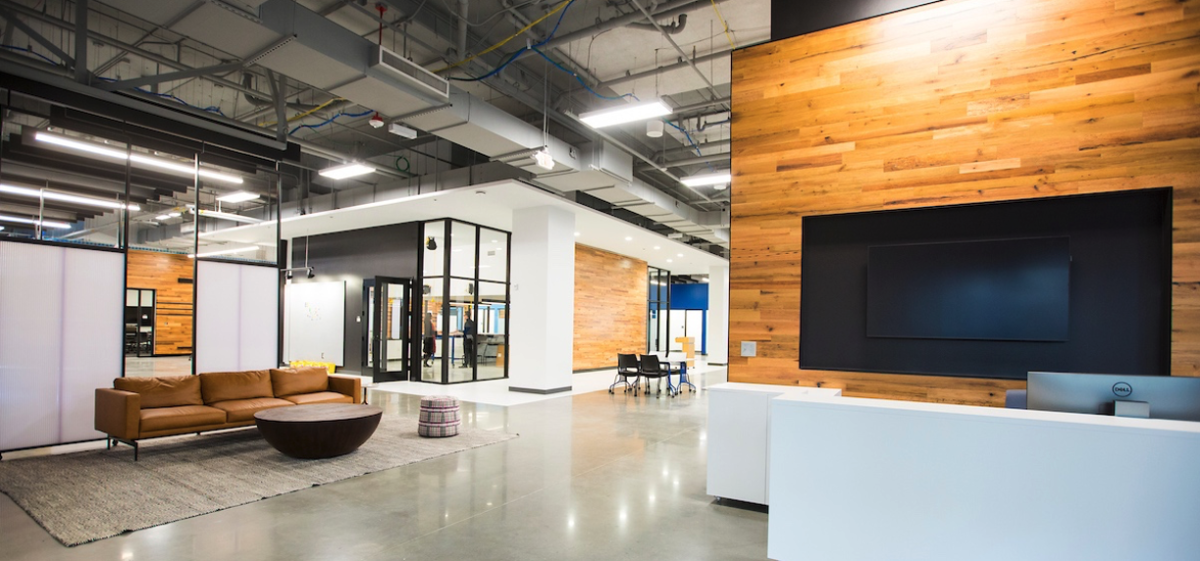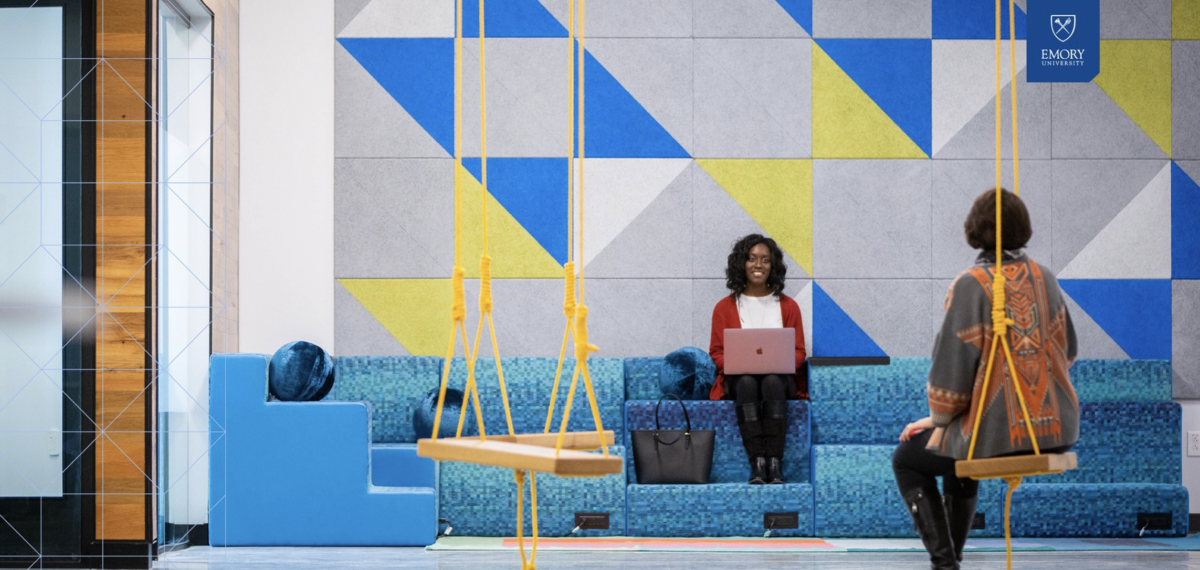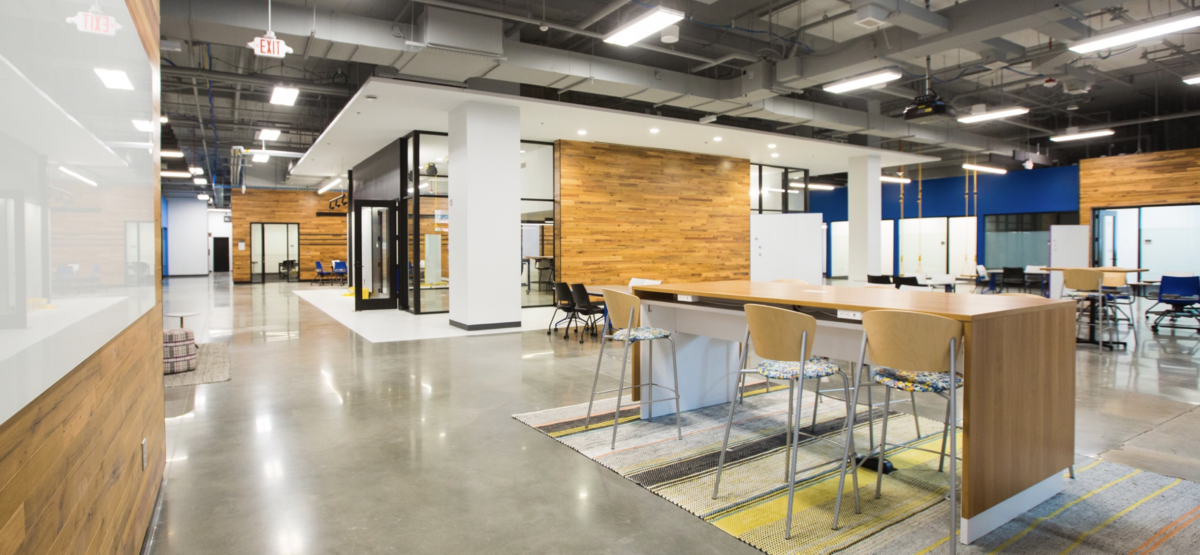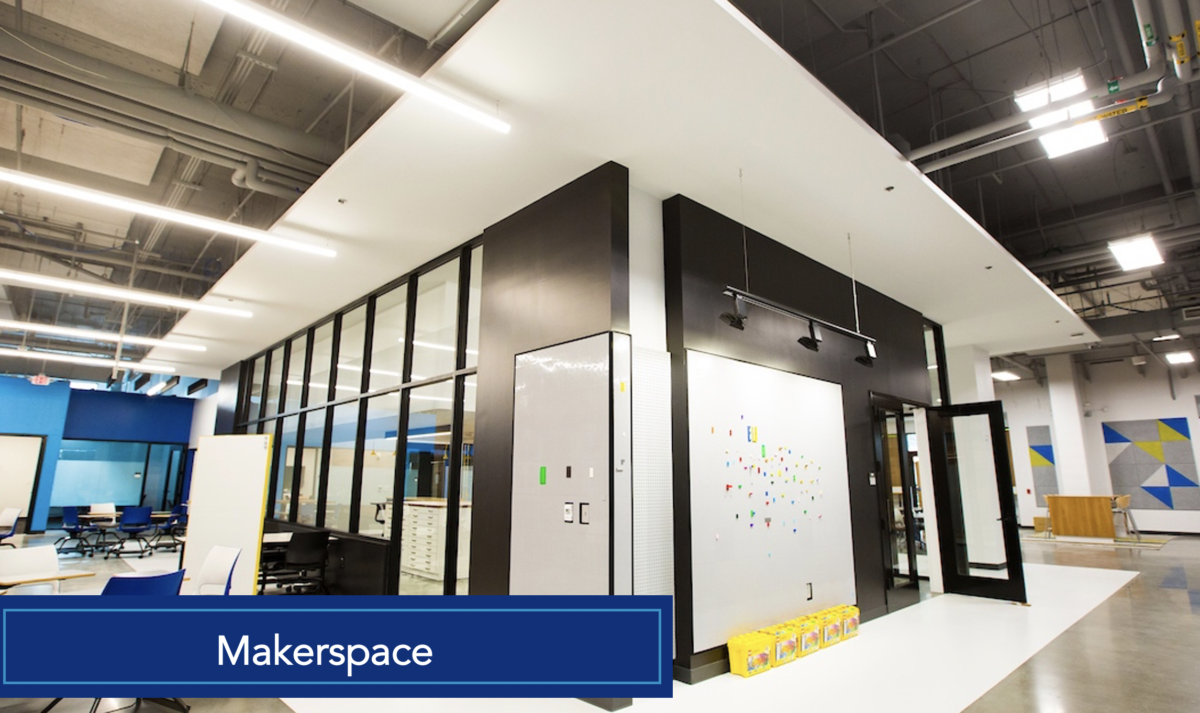
In February 2020, we were pleased to open the doors of The Hatchery, a 15,000-square-foot center located in Emory Point, for student innovation, creativity, collaboration, and problem solving. Created in response to the One Emory strategic framework’s call to “create a connected, impact-oriented intellectual community in order to make Emory an academic community of choice,” The Hatchery is designed to support and amplify existing student-focused Emory innovation and entrepreneurship programs by providing exposure, capacity and material resources in a space purpose-built to empower innovation, and in a location that connects Emory innovators to thought leaders in Atlanta and the world.
The Hatchery also offers numerous programs of its own design that are intended to advance our own unique vision of “innovation for student success.”
Everything was going well…until the pandemic hit just weeks after we opened.
As a result, The Hatchery has pivoted to serving the university by acting as a locus of programmatic innovation, spinning up and testing “MVPs” (minimum viable programs) and platforms to de-risk them for Emory. As director of The Hatchery, I recently presented at both the IT Briefing and InfoForum to let LITS know what we have going on.
What We’ve Learned
An innovation center that aims to successfully serve all members of the Emory community (students, faculty, staff, and alumni) must be built upon a clear understanding of our audiences and their needs. The consistent application of innovation methodologies, in particular Human-Centered Design and Lean Startup, has allows us to do the necessary “customer discovery” to charter a strategy, establish a space, and launch programs that are on target.
Early discovery work focused on existing staff and programs dedicated to innovation and entrepreneurship. We quickly learned that Emory has a robust ecosystem of innovation and entrepreneurship spaces, programs and organizations, but that:
- Many are undiscovered and underused—by students, faculty, and by other the other programs
- Many focus on supporting mid- to late-stage innovation, from ideation to testing, then building and scaling, wherever few focus on getting students involved, grounding them in fundamental methodologies, and working with them to source and develop ideas of value to their student experience.
Through extensive discovery work with students, we learned there are particular programs and resources that students want to see added to the ecosystem, and that The Hatchery can serve as a “larger front end of the funnel” to get more students involved in innovation work, provide a foundation, and drive more traffic downstream to existing programs designed to serve innovators and entrepreneurs who are further along in their journey.

A New Model for Innovation
This extensive discovery work point us towards a white space in higher ed innovation that we feel The Hatchery is ideally positioned to address.
Centers of innovation and entrepreneurship in higher education have traditionally been founded upon one of four common models:
- Centers that support student entrepreneurship
- Centers that support R&D and drive industry partnership for commercialization of University IP
- Centers that support interdisciplinary scholarship and cross-programmatic collaboration
- Centers that support innovation in teaching, instructional design and programmatic delivery
As an initiative of the Office of the Provost, The Hatchery supports innovation activity in all of these modes but is primarily focused on developing a complementary new model focused on innovation for student success.
What Are the Hallmarks of Innovation for Student Success?
- Student-driven/crowd-sourced strategy and program development to ensure relevance
- The application of design thinking and Lean Startup methods to improving the student experience and student lives: innovation processes that empower students to “hack” their educational career and improve their outcomes
- Purposeful collaboration to help students diversify teams, develop broader perspectives and interdisciplinary approaches
- Problem-based learning in innovation and entrepreneurship as a pathway to the acquisition and applied practice of both innovation expertise and professional soft skills
- Personal coaching, tied to successful handoff to existing later-stage or discipline-specific programs (also drives Emory success by using The Hatchery as a bigger “front end of the funnel,” and driver to innovation and entrepreneurship programs across campus)
- The development and nurturing of an innovation crossroads community (undergrads, grads, faculty, staff, alumni, and outside partners) to expand cognitive and professional horizons and to create a continuum of experience for Emory innovator—from pre-enrollment to alumnihood.

Programs to Date
During remote operations, The Hatchery serves primarily as a locus of programmatic innovation, and as such we are constantly testing new content, platforms and digital ecosystems to deliver the best remote learning programs. It has been a pleasure to work closely with Larry Frazer and his team, as well as with Wade Moricle and members of the IT Briefing team, to share ideas and best practices, and explore solutions. Because of the current, experimental nature of our work, actual program offerings will change in function of ongoing discovery, prototyping, and testing. We welcome input from all stakeholders. These are a few of the program we’ve been able to offer that deliver on our promise of “innovation for student success.”
- Peer to Peer Master Class: Classes taught by students that provide introductions to topics of interest to all innovators and entrepreneurs.
- Emory Innovators Speaker Series: Conversations with Emory faculty, staff, and alumni who work in innovation and entrepreneurship, or have taken innovative approaches to designing their careers and disrupting their industries.
- Crooked Careers: A conversation between Hatchery staff and students on how to leverage innovation processes and mindsets to design careers, particularly during times of economic uncertainty.
- Hobby to Hustle Workshops: A half-day workshop that provides students with an introduction to Lean Startup methods so they can take their personal passion projects to the next level.
- Hobby to Hustle Sprints: Hobby to Hustle Sprints provide structure, coaching, and accountability to students and staff interested in applying Lean Startup to taking their passion projects to the next level or turning side gigs into a full-time hustle.
- HCD 101: A pilot program with EEVM to develop an engaging introduction to Human-Centered Design.
- Innovation Design Challenge: The Hatchery develops innovation design challenges for students to create solutions using a Human-Centered Design sprint process. The challenge prompts emerge from conversations with other university and student entities, and deal with improving the student experience.
- Passion Project Micro-Grants: The Hatchery provides $400 micro-grants to student projects. In addition to funding, grant recipients receive a structured innovation program to develop their project, and personalized coaching from The Hatchery staff.
- Innovation Internships: Win/win internships that provide significant professional development for students and insights into core business challenges for The Hatchery through a 6-week curriculum in applied design thinking. 4 internships executed in summer were: communications innovation, student-alumni innovation programs, remote engagement innovation, and student certificates and micro-credentialing innovation.
- Startup Launch Accelerator: A high-touch GBS tentpole program that will be supported by The Hatchery in Fall Semester: full funding, plus an open offer to help GBS develop and launch more scalable associated events/content (synchronous and asynchronous) and to host and promote such offerings through Hatchery channels.
- Innovation Certificate: First three courses of a six-course sequence covering foundations of innovation, leading to an innovation certificate or micro-credential (pilot in conjunction with ECE). Program scale limited only by instructor capacity. Will pilot with up to 30 using only Hatchery staff hours. Could go on transcript, under auspices of ECE as system of record for extra-curricular certification.
- Hatchery Inno Agency: Student groups “hire” (no cost) students trained by The Hatchery in innovation process to define and solve their problems (Hatchery scales impact through student consultants).
- Alumni Academy Pilot: With EAA and ECE, create/test pilot course in the highly-scalable model proposed by summer interns: consistently-structured asynchronous, hosted on LMS; short and snackable; leverage alumni for professional skills acquisition, further learning, and networking. (NOTE: This follows a typical model for “programmatic innovation,” Where The Hatchery surfaces a program students want, helps to prototype it, then offers it to the partner to own and scale.)

Here are three anticipated programs for Spring Semester:
- Innovation Certificate: Final three courses of a six-course sequence covering foundations of innovation, leading to an innovation certificate.
- Weekend Takeover: Responding to student demand for more programming, provide Hatchery space, design thinking support, and seed money to students to experiment with weekend programs. Can be tested using existing staff in weekend/evening rotation.
- Innovation Partnerships: The Hatchery coaches faculty and students in partner departments/programs on innovation process to support programmatic and social impact innovation. Innovation Partnerships currently being explored with QTM and Candler Contextual Education
To read more about the genesis of The Hatchery, go the January 2020 Emory News article called “Innovation. Ecosystem.“
Leave a Reply